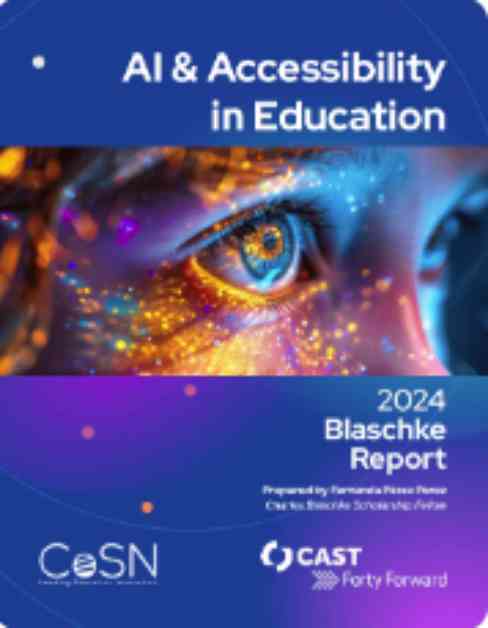CoSN and CAST recently published a detailed report titled “AI and Accessibility in Education” written by Fernanda Pérez Perez, a recipient of The Blaschke Fellowship. The report delves into how artificial intelligence (AI) can improve educational accessibility and support for students, especially those with disabilities. As AI tools like Generative AI (GenAI) and assistive technologies become more common in schools, it is important to understand their benefits and limitations.
The report serves as a valuable guide for educators, district leaders, and policymakers, offering insights into the advantages and challenges of AI in education. It also provides practical strategies for the ethical and effective implementation of AI to enhance accessibility.
According to Keith Krueger, CEO of CoSN, integrating AI into education shows great promise in improving accessibility and support for all students. By focusing on inclusive design, implementing comprehensive policies, and providing ongoing professional development, we can create a future where every student, regardless of their background or abilities, can thrive through the thoughtful use of AI.
The report highlights the following key points:
1. Potential of AI for Accessibility:
AI tools can enhance personalized learning by tailoring educational content to meet the unique needs of each student, especially those with disabilities. For example, text-to-speech software, speech recognition systems, and AI-integrated communication tools can improve the learning experience for students with diverse needs. Additionally, AI can help reduce teacher burnout by automating administrative tasks like grading, allowing educators to focus more on student interaction and support.
2. Use Cases and Examples:
Case studies demonstrate how AI can enhance accessibility in education. For instance, AI tools have been used to create personalized learning materials, facilitate communication for students with speech disabilities, and develop accessible math assessments for blind students.
3. Challenges and Risks:
While AI has the potential to transform education, there are challenges such as data privacy concerns, algorithmic bias, and limitations in personalized learning. It is essential to create AI systems with input from diverse groups and train them on diverse datasets to ensure accuracy and representation, especially for students with disabilities. Designing AI tools with accessibility in mind is crucial to prevent widening existing inequalities.
4. Policy and Frameworks:
The report emphasizes the importance of policy frameworks and guidelines to ensure the ethical use of AI in education. Policies like the Americans with Disabilities Act (ADA) and the Universal Design for Learning (UDL) framework help create inclusive educational environments that cater to all students’ needs.
In conclusion, the report proposes a three-level solution for safe GenAI implementation, emphasizing collaboration among educators, policymakers, and technology developers. By working together, we can effectively navigate the complexities of AI in education and create inclusive learning environments for all students.
For further insights on enhancing accessibility using AI, visit CoSN’s blog for informative posts on artificial intelligence in K-12 education. Fernanda Pérez Perez, the author of the report, expresses gratitude for the opportunity to conduct research on AI and accessibility in education. The report’s focus on inclusivity resonates with Kathy Hurley, a former special education teacher, and Lindsay Jones, CEO of CAST, who believe in leveraging AI to make education more accessible and inclusive. The complete report is available for download on the CoSN website.














